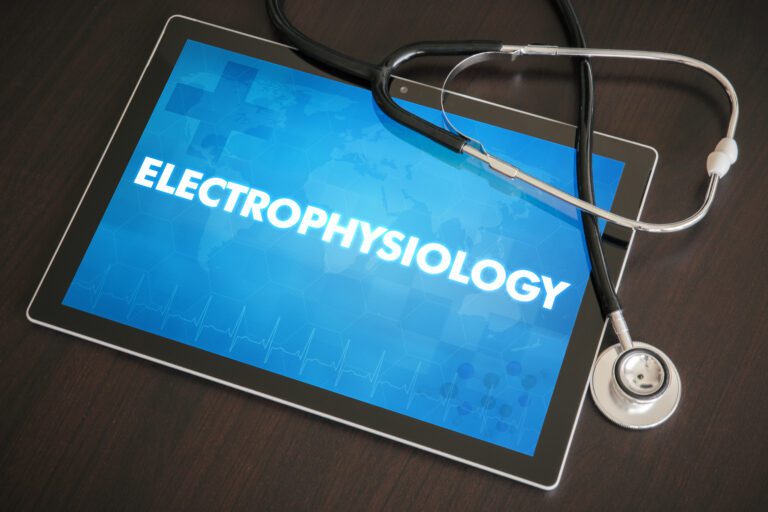If you have been recently diagnosed with a heart rhythm disorder, you may be referred to see a cardiac electrophysiologist. While this long title may be a little hard to pronounce, electrophysiologists serve an essential function in assessing, diagnosing, and managing heart rhythm conditions.
Here is everything you need to know about electrophysiologists:
What Does an Electrophysiologist Do?
Simply put, an electrophysiologist is your go-to doctor for the treatment of heart rhythm disorders. Also known as cardiac electrophysiologists, arrhythmia specialists, an electrician of the heart, or EPs, an electrophysiologist is able to provide treatment of heart rhythm disorders like atrial fibrillation (AFib).
An electrophysiologist is a type of cardiologist. Training for this profession usually includes three years of general cardiology training and two additional years of electrophysiology training, where the doctor becomes an expert in heart rhythm conditions.
An EP is a doctor that is able to diagnose and treat heart rhythm disorders through a health history, physical exam, and diagnostic testing. They may prescribe medications to help manage your disease symptoms, and can perform corrective procedures when indicated. Regular check-up appointments may be used to keep track of your condition and evaluate the long-term success of any treatments.
Common procedures and treatments performed by an electrophysiologist include:
● Initial cardiac assessments
● Diagnostic testing and heart imaging
● Management of prescription medications (such as anti-arrhythmics)
● Electrophysiology studies
● Catheter ablation procedures
● Defibrillator Insertion
● Left Atrial Appendage Closure (such as the WATCHMAN procedure)
What Is The Difference Between a Cardiologist and an Electrophysiologist?
Technically speaking, an electrophysiologist IS a cardiologist — a cardiologist with a specialized area of practice, that is!
A cardiologist is a medical professional that studies and treats the heart and related cardiac disease. Within the cardiology profession, different heart doctors practice subspecialties of cardiology — one of which is electrophysiology.
When people experience heart rhythm problems, it calls for a specialist who is trained in rhythm disorders of the heart. An EP can order treatments and perform corrective procedures to restore the heart’s natural rhythm.
What Types of Conditions Does an Electrophysiologist Treat?
An EP is able to treat a wide variety of heart rhythm disorders. Some of the common heart conditions treated by an electrophysiologist include:
● Atrial fibrillation — an arrhythmia characterized by fast and irregular heart rhythm that comes from the upper chambers of the heart
● Tachycardia — when the heart beats too quickly
● Bradycardia — when the heart beats too slow
● Ventricular tachycardia — a dangerous arrhythmia that causes a very fast heart rate from the lower chambers of the heart
● Supraventricular tachycardia — a sudden fast heart rate change that comes from the upper chambers of the heart, different from atrial fibrillation
● Long QT syndrome — a disorder of the heart that causes sudden ventricular arrhythmias
● Sudden cardiac arrest — when the heart suddenly stops beating
● Syncope — sudden loss of consciousness
AFib is one of the most commonly treated arrhythmias in America. Treatment by an electrophysiologist can include lifestyle changes (diet and exercise), prescribing anti-arrhythmic medications, and performing corrective procedures to reduce symptoms, such as a catheter ablation.
What Tests Can an Electrophysiologist Do?
Cardiac testing is an essential component for identifying heart conditions. In order for an electrophysiologist to diagnose any heart condition, they may order some of the following cardiac tests:
● Electrocardiograms (ECGs or EKGs)
● Echocardiograms
● Electrophysiology studies
● Blood tests
● Holter monitoring
● Cardiac stress testing
What Is an Electrophysiology Study (EPS)?
One of the most common tests done by an EP is an electrophysiology study. This study is commonly done in patients who have a newly discovered abnormal heart rhythm.
During an EPS, an electrophysiologist inserts one or more electrode catheters into a large vein in the groin or neck. The inserted electrode will send electrical impulses to your heart, and the resulting electrical activity will be recorded for assessment. This procedure is commonly done under intravenous sedation for additional comfort for the patient.
An electrophysiology study is able to:
● Identify the source of an irregular or rapid heart arrhythmia
● Indicate what medications could be used for effective treatment
● Indicate if you may require additional procedural treatment, such as catheter ablation or the insertion of a pacemaker (many times these additional steps are performed at the same time as the EP study)
When Should I See an Electrophysiologist?
Like with all medical conditions, the earlier you are able to identify and treat the problem, the better the outcomes for treatment. This is especially true for atrial fibrillation, the most common heart rhythm disorder worldwide. The sooner someone with atrial fibrillation sees an electrophysiologist, the more rapid the relief of symptoms and the better the long-term results.
Regular assessment from your primary care provider is the best way to catch any changes to your heart health early.
The following symptoms may be a sign of a heart rhythm disorder:
● Bradycardia (low heart rate) with symptoms such as dizziness, fatigue, and disorientation
● Tachycardia (high heart rate) at rest
● Feeling like your heart is skipping a beat
● An irregular heart rhythm
● Palpitations
If you are experiencing any of the above symptoms, talk with your primary care provider about getting a referral to see an electrophysiologist. Early detection leads to better treatment options, and better results, so it’s definitely worth mentioning!
Dr. Percy F. Morales, MD: Electrophysiologist in Houston, TX
Dr. Morales brings a unique approach to arrhythmia management, such as atrial fibrillation, that focuses on rapid improvement of symptoms with an emphasis on long-term results. Over the years, Dr. Morales has treated thousands of patients with atrial fibrillation and other arrhythmias, using a variety of methods including medical therapy, catheter ablation procedures, and lifestyle modifications.
When Dr. Morales first meets a new patient with atrial fibrillation, he frequently explain that there will be both short-term goals and long-term goals in the course of their care. Many patients diagnosed with atrial fibrillation will need a strategy they can utilize for years to come, but the management of atrial fibrillation requires a two-pronged strategy (short term treatment and long term treatment plans) and it is necessary to address both immediate and future goals to achieve the best possible outcomes.
It is truly a great feeling to see patients that have reversed AFib due to a comprehensive treatment plan that utilizes both a short-term and long-term treatment plan. The improvement in quality of life they experience is amazing!
Dr. Morales currently only sees in-person patients at Modern Heart and Vascular with multiple Houston Area locations in Humble, The Woodlands, and Katy, TX.
The Best Atrial Fibrillation Book
Your Complete Guide To AFib: The Essential Manual For Every Patient With Atrial Fibrillation

Shop AFib Products on Amazon
KardiaMobile 6-Lead Personal EKG Monitor – Six Views of The Heart – Detects AFib and Irregular Arrhythmias – Instant Results in 30 Seconds – Works with Most Smartphones - FSA/HSA Eligible
13% Off
KardiaMobile 1-Lead Personal EKG Monitor – Record EKGs at Home – Detects AFib and Irregular Arrhythmias – Instant Results in 30 Seconds – Easy to Use – Works with Most Smartphones - FSA/HSA Eligible
$79.00 (as of June 16, 2025 15:14 GMT -06:00 - More infoProduct prices and availability are accurate as of the date/time indicated and are subject to change. Any price and availability information displayed on [relevant Amazon Site(s), as applicable] at the time of purchase will apply to the purchase of this product.)
Apple Watch Series 9 [GPS 41mm] Smartwatch with Storm Blue Aluminum Case with Silver Sport Band M/L. Fitness Tracker, Blood Oxygen & ECG Apps, Always-On Retina Display
(as of June 16, 2025 08:46 GMT -06:00 - More infoProduct prices and availability are accurate as of the date/time indicated and are subject to change. Any price and availability information displayed on [relevant Amazon Site(s), as applicable] at the time of purchase will apply to the purchase of this product.)
Fitbit Sense 2 Advanced Health and Fitness Smartwatch with Tools to Manage Stress and Sleep, ECG App, SpO2, 24/7 Heart Rate and GPS, Shadow Grey/Graphite, One Size (S & L Bands Included)
10% Off
OMRON 2-in-1 Upper Arm Blood Pressure Monitor & 1-Lead EKG Monitor - Clinically Validated Blood Pressure Arm Cuff & Machine - Use OMRON Connect App
24% Off
Samsung Galaxy Watch 6 44mm Bluetooth Smartwatch, Fitness Tracker, Personalized HR Zones, Advanced Sleep Coaching, Heart Monitor, BIA Sensor, Health Wellness Insights, Big Screen, US Version, Graphite
$353.21 (as of June 16, 2025 07:34 GMT -06:00 - More infoProduct prices and availability are accurate as of the date/time indicated and are subject to change. Any price and availability information displayed on [relevant Amazon Site(s), as applicable] at the time of purchase will apply to the purchase of this product.)
Natural Rhythm Triple Calm Magnesium 150 mg - 120 Capsules – Magnesium Complex Compound Supplement with Magnesium Glycinate, Malate, and Taurate. Calming Blend for Promoting Rest and Relaxation.
$20.77 ($0.17 / Count) (as of June 16, 2025 07:34 GMT -06:00 - More infoProduct prices and availability are accurate as of the date/time indicated and are subject to change. Any price and availability information displayed on [relevant Amazon Site(s), as applicable] at the time of purchase will apply to the purchase of this product.)
Pure Encapsulations Magnesium (Glycinate) - Supplement to Support Stress Relief, Sleep, Heart Health, Nerves, Muscles, and Metabolism* - with Magnesium Glycinate - 180 Capsules
$44.60 ($0.25 / Count) (as of June 16, 2025 08:46 GMT -06:00 - More infoProduct prices and availability are accurate as of the date/time indicated and are subject to change. Any price and availability information displayed on [relevant Amazon Site(s), as applicable] at the time of purchase will apply to the purchase of this product.)















![Apple Watch Series 9 [GPS 41mm] Smartwatch with Storm Blue Aluminum Case with Silver Sport Band M/L. Fitness Tracker, Blood Oxygen & ECG Apps, Always-On Retina Display #1](https://m.media-amazon.com/images/I/311xwtp4mFL._SL100_.jpg)
![Apple Watch Series 9 [GPS 41mm] Smartwatch with Storm Blue Aluminum Case with Silver Sport Band M/L. Fitness Tracker, Blood Oxygen & ECG Apps, Always-On Retina Display #2](https://m.media-amazon.com/images/I/41j+8AaUGsL._SL100_.jpg)
![Apple Watch Series 9 [GPS 41mm] Smartwatch with Storm Blue Aluminum Case with Silver Sport Band M/L. Fitness Tracker, Blood Oxygen & ECG Apps, Always-On Retina Display #3](https://m.media-amazon.com/images/I/41jIyxZitnL._SL100_.jpg)
![Apple Watch Series 9 [GPS 41mm] Smartwatch with Storm Blue Aluminum Case with Silver Sport Band M/L. Fitness Tracker, Blood Oxygen & ECG Apps, Always-On Retina Display #4](https://m.media-amazon.com/images/I/41IpNJERjCL._SL100_.jpg)
![Apple Watch Series 9 [GPS 41mm] Smartwatch with Storm Blue Aluminum Case with Silver Sport Band M/L. Fitness Tracker, Blood Oxygen & ECG Apps, Always-On Retina Display #5](https://m.media-amazon.com/images/I/31o17yhfYpL._SL100_.jpg)





































